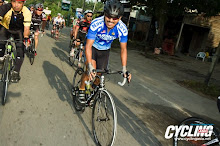When decreasing your training improves performance
Overtraining syndrome frequently occurs in athletes who are training for competition or a specific event and train beyond the body's ability to recover. Athletes often exercise longer and harder so they can improve. But without adequate rest and recovery, these training regimens can backfire, and actually decrease performance.
Conditioning requires a balance between overload and recovery. Too much overload and/or too little recovery may result in both physical and psychology symptoms of overtraining syndrome.
Common warning signs of overtraining include:
• Washed-out feeling, tired, drained, lack of energy
• Mild leg soreness, general aches and pains
• Pain in muscles and joints
• Sudden drop in performance
• Insomnia
• Headaches
• Decreased immunity (increased number of colds, and sore throats)
• Decrease in training capacity / intensity
• Moodiness and irritability
• Depression
• Loss of enthusiasm for the sport
• Decreased appetite
• Increased incidence of injuries.
• A compulsive need to exercise
It's hard to predict overtraining since everyone's body is different. It is important, however, to vary training through the year and schedule in significant rest time.
Treating Overtraining Syndrome
If you suspect you are overtraining, the first thing to do is reduce or stop your exercise and allow a few days of rest. Drink plenty of fluids, and alter your diet if necessary. Crosstraining can help you discover if you are overworking certain muscles and also help you determine if you are just mentally fatigued. A sports massage can help you recharge overused muscles.
Measuring Overtraining
There are several ways you can objectively measure some signs of overtraining. One is by documenting your heart rates over time. Track your aerobic heart rate at a specific exercise intensities and speed throughout your training and write it down. If your pace starts to slow, your resting heart rate increases and you experience other symptoms, you may heading into overtraining syndrome.
You can also track your resting heart rate each morning. Any marked increase from the norm may indicated that you aren't fully recovered.
Another way to test recover to use something called the orthostatic heart rate test, developed by Heikki Rusko while working with cross country skiers. To obtain this measurement:
1. Lay down and rest comfortably for 10 minutes the same time each day (morning is best).
2. At the end of 10 minutes, record your heart rate in beats per minute.
3. Then stand up
4. After 15 seconds, take a second heart rate in beats per minute.
5. After 90 seconds, take a third heart rate in beats per minute.
6. After 120 seconds, take a fourth heart rate in beats per minute.
Well rested athletes will show a consistent heart rate between measurements, but Rusko found a marked increase (10 beats/minutes or more) in the 120 second-post-standing measurement of athletes on the verge of overtraining. Such a change may indicate that you have not recovered from a previous workout, are fatigued, or otherwise stressed and it may be helpful to reduce training or rest another day before performing another workout.
A training log that includes a note about how your feel each day can help you notice downward trends and decreased enthusiasm. It's important to listen to your body signals and rest when you feel tired.
You can also ask those around you if they think you are exercising too much.
While there are many proposed ways to objectively test for overtraining, the most accurate and sensitive measurements are psychological signs and symptoms and changes in an athlete's mental state. Decreased positive feelings for sports and increased negative feelings, such as depression, anger, fatigue, and irritability often appear after a few days of intensive overtraining. Studies have found increased ratings of perceived exertion during exercise after only three days of overload.
Research on overtraining syndrome shows rest is the primary treatment plan. Some new evidence indicating that low levels of exercise (active recovery) during the rest period will speed recovery. Moderate exercise has also been shown to increase immunity. Total recovery can take several weeks and includes proper nutrition and stress reduction.
The subjective assessments, and mental state of an athlete is clearly the most reliable indicator of overtraining. Unfortunately, most athletes ignore these signs or wait too long before doing something. An important component of exercise is to objectively measure your training and modify it before damage is done.
Monday, May 25, 2009
Subscribe to:
Post Comments (Atom)


1 comment:
hmmmm...i over trained coz i need to achieve some Weight Loss
Post a Comment